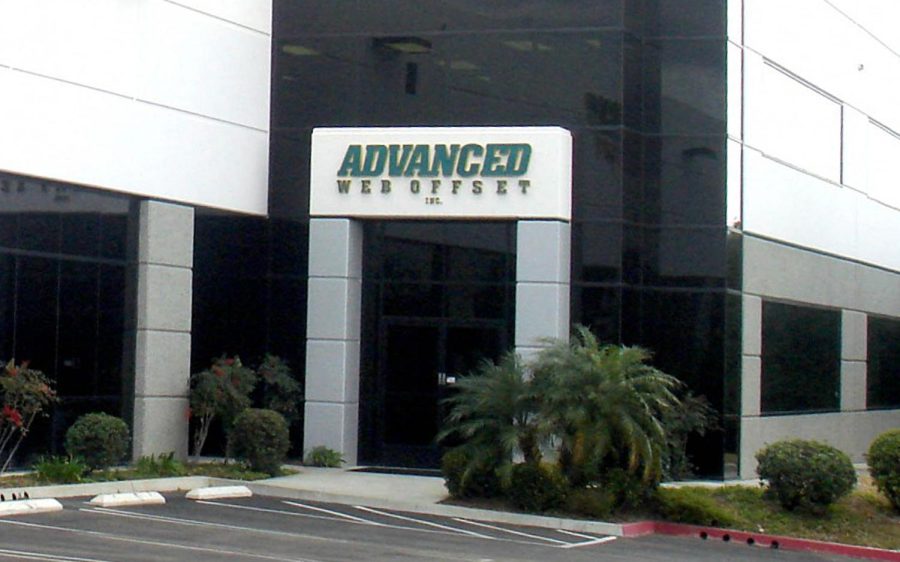San Diego community newspapers left in limbo after losing local printer
College and high school journalism programs also affected
The front of the former Advanced Web Offset printing facility in Vista is shown in an undated photo. The plant, the last of its kind serving San Diego County, was closed in August after it was purchased by an Orange County company. (Publicity photo)
October 7, 2022
Community newspapers in North San Diego County were left scrambling for printing services in recent days after the region’s last facility for such work shut down and dropped their contracts, local media sources said.
The hit to production and distribution expanded beyond North County independents to include college and high school newspapers and other publications throughout the county. The closure and subsequent vacuum has stunned industry observers.
“It’s mystifying that in a county of 3 million that there isn’t a way for people to get newspapers,” Dean Nelson, director of Point Loma Nazarene University’s journalism program, told the North Coast Current.
Advantage ColorGraphics purchased the last printing plant for newspapers in San Diego County — Advanced Web Offset of Vista — in August. Almost immediately, as Encinitas-based Coast News reported, operations shifted to Advantage’s home location in Anaheim. At the time, The Coast News quoted the company’s management as saying they “will continue to service your account as we transition each of you into Advantage’s modern expansive operations.”
U-T Community Press, which publishes several weeklies in North County, announced on Friday, Oct. 7, that it had to configure its publications’ newspapers to a larger size because of a last-minute change in printers.
“The Los Angeles Times has come to the Advocate’s rescue,” U-T Community Press Publisher Phyllis Pfeiffer said in the announcement, which was tailored to each of its newspapers and websites, including the Encinitas Advocate. “San Diego’s sole offset printer went out of business in August, causing printing chaos among local publishers. Your Encinitas Advocate is now taller so that we can run on the presses of our parent company. We’ve had to make this change almost overnight, so watch during the next few weeks as we enrich the design and bring you even more news in our expanded format.”
A source close to U-T Community Press who requested anonymity said that the change in size from a smaller tabloid to a larger broadsheet had been in the planning stages for some time but was accelerated after the contract with Advantage ColorGraphics was dropped. The abrupt changeover could lead to frustration among advertisers as well since ads that were once reserved to be larger in a tabloid are now smaller in a broadsheet, with no time to make adjustments.
The weekly U-T Community Press is part of the daily San Diego Union-Tribune, which in turn is coupled with the Los Angeles Times, where the Union-Tribune is printed. The Times’ presses, however, are not set up for the weeklies’ smaller sizes.
Sources told the North Coast Current that Advantage works with government contracts and mailing services rather than less-lucrative community newspapers.
Attempts to reach Advantage ColorGraphics for information were unsuccessful as of the end of business Friday. Messages sent to an email address provided on its website were returned as undeliverable. There was no reply to a voicemail message seeking comment.
Lyle E. Davis, publisher of The Paper, based in San Marcos, confirmed that he and other local newspaper publishers were left scrambling for new offset web news printing outlets. While other papers lost their contracts, Davis said he was able to remain with Advantage for the time being.
“I felt sure, as a smaller paper, (50,000 readers weekly) that we would be next to get the axe,” he said in an email to the North Coast Current.
The status of The Coast News’ printing contract is unclear. Management at The Coast News did not respond to an emailed request for comment. Davis, however, said The Coast News was in a holding pattern while still printing with Advantage, according to discussions he had with The Coast News’ ownership.
“Several key staffers at AWO are now staff members of the new printer … and I continue to work with them,” Davis wrote to the Current. “We were with AWO for over 20 years and loved the staff and relationship. We are hoping that continues but are kinda waiting for the other shoe to drop.”
The Valley Roadrunner and Escondido Times-Advocate, in their own news group, were also affected by the last-minute disruption. Management at those publications declined to comment on the situation publicly when contacted by the North Coast Current. However, a note to readers on the front pages of the Oct. 6 editions explained why a service interruption could have significant consequences.
“We have a certain number of papers that we are required to print in order to maintain our adjudication, which is our ability to print legal advertising,” the note explained.
Court-approved adjudication allows newspapers to publish legal notices for public agencies and private entities and individuals. In a time of decreased advertising revenue, legal notices are often a guaranteed source of income, making adjudicated status highly sought after and crucial to maintain.
College and high school newspapers were caught off guard by the service interruption as well.
Nelson, of Point Loma Nazarene University, said he was frustrated by how the company abruptly cut the contract for The Point campus newspaper.
“We had a contract as of July of this year with AWO,” the original company, Dean said in an interview.
Then, in August, the journalism program was told that AWO was closing with “basically an ‘it sucks to be you’ kind of note,” he said.
The Point and other San Diego newspapers have been able to secure Reed Printing in Ontario as their new outlet, Nelson said. Southwest Offset Printing in Gardena has also reportedly picked up some of the contracts. The Point and one local high school newspaper are piggybacking delivery from Reed Printing, he said.
The disruption even crosses the U.S.-Mexico border, according to Nelson. Zeta, based in Tijuana, also printed with Advanced Web Offset.
Given the challenges that the printing industry faces, Nelson said he understands that a priority shift is a business decision. Despite the frustration the contract suspensions have caused, he also said he understands that it’s a symptom of a larger reality that newspapers might be seeing their final days. But that’s a process, not something that should happen cold-turkey, he noted.
Nelson likened Advantage ColorGraphics’ move to suspend contracts in a county with no such access to printing to suddenly stopping the sale of all gasoline now because gas-powered vehicles are eventually on the way out. That, too, would not be sustainable.
“It’s dumbfounding,” he said. “But it’s of course a business decision.”
Temple Northrup, the director of the Journalism and Media Studies program at San Diego State University, shared similar concerns.
“The closing of the last local offset web printer really highlights the challenges of news organizations today to find ways to keep a printed version of their product,” Northrup told the North Coast Current via email. “Even with subscribers and advertisers, it may not be feasible to maintain a printed product.”
Newspapers are still read, especially in smaller communities, including colleges and high schools, Nelson said.
“With schools, there are all these students that know that if you have a hard copy of the paper, your readership is way higher than just a website alone,” he said. “In that small town, small community kind of way, newspapers are still viable.”
The closure of Advanced Web Offset ends an era of broad access to large-scale news printing in San Diego County.
Up until the late 2000s, most local papers owned their own presses, such as West Coast Community Newspapers in Encinitas and later Carlsbad, the Vista Press in Vista, Pomerado Newspapers in Poway, and the daily North County Times in Oceanside and Escondido. The San Diego Union-Tribune had its printing plant in Mission Valley for decades. Those were in addition to standalone printing operations such as Trident Web Offset and Advanced Web Offset, which opened in Vista in 1989.
San Dieguito Printers, the founding company of the Solana Beach-based Citizen (among the papers that eventually made up the North County Times), dated back to the 1930s and closed in 2016.
As papers merged or closed, presses were sold to other companies or for scrap.
In 2010, Advanced Web Offset bought the assets of VQS, a North County competitor that printed school and community newspapers. By 2012, the North County Times closed its presses and contracted with The Press-Enterprise in Riverside. The Times was then sold and folded into the Union-Tribune by the end of that year.
When the Union-Tribune was bought by the parent company of the Los Angeles Times in 2015, the U-T’s presses were shuttered and printing was shifted to the Times’ plant up north.
Letters to the editor are welcome. Send letters to letters[at]northcoastcurrent.com. Follow the North Coast Current on Twitter at @nccurrent.
(Story updated 10/9/2022 at 5:55 p.m.)
(Story updated 10/8/2022 at 5:05 p.m.)
cardiff current, encinitas current




